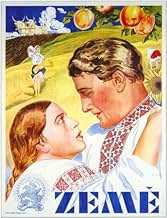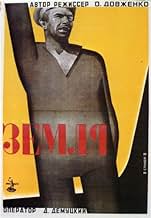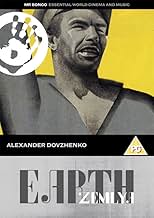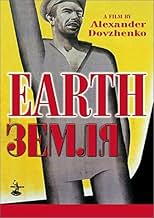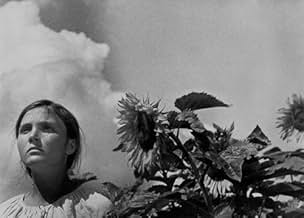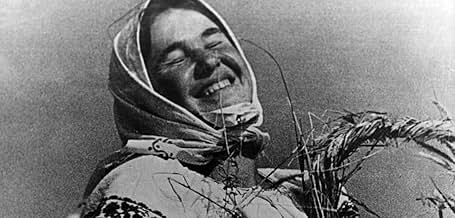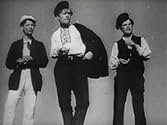VALUTAZIONE IMDb
7,2/10
6740
LA TUA VALUTAZIONE
Aggiungi una trama nella tua linguaIn the peaceful countryside, Vassily opposes the rich kulaks over the coming of collective farming.In the peaceful countryside, Vassily opposes the rich kulaks over the coming of collective farming.In the peaceful countryside, Vassily opposes the rich kulaks over the coming of collective farming.
- Regia
- Sceneggiatura
- Star
- Premi
- 1 vittoria e 1 candidatura in totale
Stepan Shkurat
- Opanas
- (as S. Shkurat)
Semyon Svashenko
- Vasyl - son of Opanas
- (as S. Svashenko)
Yuliya Solntseva
- Daughter of Opanas
- (as Yu. Solntseva)
Yelena Maksimova
- Natalya - Vasyl's fiancee
- (as Ye. Maksimova)
Nikolai Nademsky
- Ded Semyon
- (as N. Nademsky)
Ivan Franko
- Kulak Belokon
- (as I. Franko)
Pyotr Masokha
- Khoma - son of kulak Belokon
- (as P. Masokha)
Vladimir Mikhaylov
- Priest
- (as V. Mikhaylov)
Pavel Petrik
- Young Party-Cell Leader
- (as P. Petrik)
P. Umanets
- Chairman of the Village Soviet
- (as Umanets)
Luka Lyashenko
- Young Kulak
- (as L. Lyashenko)
Vasiliy Krasenko
- Old Peter
- (non citato nei titoli originali)
M. Matsyutsia
- Farm Girl
- (non citato nei titoli originali)
Recensioni in evidenza
In Ukraine the landowners hold out against progress and the rights of communally worked farms of the people. When one such farm gets a tractor to further help them one of the richer farmers murders one of the collective, hoping to stop the movement in its tracks. However the opposite is true and the collective rises up out of the oppression and the tragedy to overcome the selfish and cruel approach of the rich.
This is one of those films that I knew I had to see rather than one of those films that are less well regarded but are less demanding to watch. I am glad that I finally got round to it because it is technically and visually a very good film with some very striking images. This is different from it being a good film due to the narrative though because in this regard it is quite a mixed bag. The structure of the tale is not great and it doesn't flow together in a way that I found engaging but more of concern to the modern viewer is the sweeping unquestioning propaganda that the story essentially is. It would be nice to pretend that this does not detract from the film but it does and not because I happen to disagree with the point being made but just because it is the simplistic clumsy point making of propaganda and it does jar slightly.
Dovzhenko's visuals are where the film is strongest though and it is worth seeing for this because whether is the depiction of sorrow or the beauty of the open fields, he catches it really well. If only he had done more with the performances then things would have been helped, not to mention the clunky dialogue cards (although I have to assume that those are mostly down to poor translation). So as long as you are not expecting this to be a fun experience or a great story then it is indeed a classic film that you should watch as part of an education in cinema.
This is one of those films that I knew I had to see rather than one of those films that are less well regarded but are less demanding to watch. I am glad that I finally got round to it because it is technically and visually a very good film with some very striking images. This is different from it being a good film due to the narrative though because in this regard it is quite a mixed bag. The structure of the tale is not great and it doesn't flow together in a way that I found engaging but more of concern to the modern viewer is the sweeping unquestioning propaganda that the story essentially is. It would be nice to pretend that this does not detract from the film but it does and not because I happen to disagree with the point being made but just because it is the simplistic clumsy point making of propaganda and it does jar slightly.
Dovzhenko's visuals are where the film is strongest though and it is worth seeing for this because whether is the depiction of sorrow or the beauty of the open fields, he catches it really well. If only he had done more with the performances then things would have been helped, not to mention the clunky dialogue cards (although I have to assume that those are mostly down to poor translation). So as long as you are not expecting this to be a fun experience or a great story then it is indeed a classic film that you should watch as part of an education in cinema.
Stalin may have wanted an ode to collective agriculture; what he got instead was a hymnal to mother nature and the toiling offspring who dwell in her bosom. Those opening shots of pulsating fields waving in the wind have no equal for sheer evocative power. Earth is revealed at once as a living, breathing being and bountiful provider. Flower, fruit, decay, renewal -- nature's timeless cycle. The soundless imagery is at times so wonderfully lyrical that contemporary viewers may be led to recognize how much has been lost to the technology-driven cinema of today. Even the occasional plot crudities are rescued by a style that is both brilliant and unerringly pictorial. Close-ups of weather-worn peasants, a lone kulak and oxen beneath an immense sky, great rolling plains and far horizons of the Ukrainian breadbasket -- this is the sheer lyrical sweep of the Dovchenko masterpiece, a montage that transcends all obstacles, real and man-made. Not even the estimable John Ford frames primitive elements as grandly as this. There are flaws. Too many rushing crowd scenes appear without purpose, except to mimic Eisenstein's "march of history", while the propaganda thread at times blends uneasily with the lyrical. Still and all, Dovchenko pulls off the theme of new beginning more seamlessly than might be expected. Far from being a mere relic of the silent era, or an ode to Stalinist collectivism, Earth remains an enduring testament to the power of cinema as sheer visual poetry.
Dovzhenko was a 'modernist' who drew deepest inspiration from traditional arts. His ode to the beginning of the collectivization is actually an orgy of intoxicant images of bulging clouds, waving wheat fields, ripening fruits and pelting horses.
The arrival of a tractor is hailed by the farmers. They begin to believe that an improved life has started, but Kulaks murder the young leader of the village party committee. This only encourages the village inhabitants in their resoluteness. In a sublime finale sequence, Dovzhenko unites birth, death, harvest, technical progress and solidarity, when the dead are returned to Earth that he loved so much.
No abstract summary can do justice to the extraordinary sensualism of this remarkable film. Whoever searches for the roots of Andrei Tarkovsky's cinema has to start with "Zemlya".
The arrival of a tractor is hailed by the farmers. They begin to believe that an improved life has started, but Kulaks murder the young leader of the village party committee. This only encourages the village inhabitants in their resoluteness. In a sublime finale sequence, Dovzhenko unites birth, death, harvest, technical progress and solidarity, when the dead are returned to Earth that he loved so much.
No abstract summary can do justice to the extraordinary sensualism of this remarkable film. Whoever searches for the roots of Andrei Tarkovsky's cinema has to start with "Zemlya".
Now I regret all the times I've railed about how propaganda is synonymous with contempt for the audience. It is sometimes hard to know what to say about a movie when it is a 'best of all time list' warhorse, but not this time. I have never - ever - seen a movie with a more deliberate, or surer, sense of rhythm. Two sequences that are nothing but long montages of fruit are absolutely riveting. A man sits, re-evaluating his world view, and because it takes a long time to do that we fade to black THREE times over about a minute, without him moving or changing position. This glacial tempo lulls us, so that Dovzhenko can jolt us with the arrival of a speedy tractor; or a collectivo's joyous dance through the dust over several lengthy wide shots is disrupted by his abrupt murder. Then the movie climaxes with an unbelievable crescendo where at least FIVE events are montaged, in perfectly comprehensible rhetorical construction. The movie begins with a death scene whose understated acting is mind-boggling even now, forget 1930; the final shot balances all the anti-church rhetoric with an image that is absolutely redemptive and spiritual, only the point is that redemption is found in LIFE. I'm not being pompous, this movie actually functions on that level. It achieves poetry AND propaganda in a way that I've never ever experienced before. It kind of reminds me of Brian Wilson's "Smile" in its modest grandeur, so true that it's painful, but so f***ing great that you want to experience it again and again. You can get it for free at the St. Catharines Library.
Like 'The Birth of a Nation' or 'The Triumph of the Will', 'Earth' is a brilliant, groundbreaking film even if morally despicable. And in retrospect of what happened after its release, Stalin's liquidation of millions of Kulaks, its hard not to compare Dovzhenko's Marxism to Reifenstahl's fascism or Griffith's racism. Apologists for all of these filmmakers tell us to 'ignore the story' or 'ignore the propaganda'. Even the Kino DVD introduction instructs us to not take the film literally.
Perhaps instead of asking, 'Can propaganda be art?' the better question is , 'Can art transcend propaganda.' In 'Earth', I think Dovzhenko partially succeeds. The lyrical cycles of birth and death on the Ukrainian steppe are told with visual poetry. In fact, as the film goes on Dovzhenko obviously becomes uninterested in the circumstances of Vasily's murder and martyrdom for the collectivist cause. No doubt, the Soviet regime produced this film to (a) encourage collectivization against private ownership, and (b) Encourage a retro-pagan worship of agrarian life against orthodox Christianity. The collectivist vs. Kulak story in (a) is crude and unconvincing propaganda to a modern audience with historical perspective on Stalin's brutalities in the 1930's. However, it is with the fertile imagery and montage of natural cycles in (b) that Dovzhenko succeeds beautifully and transcends the story and makes it timeless.
Perhaps instead of asking, 'Can propaganda be art?' the better question is , 'Can art transcend propaganda.' In 'Earth', I think Dovzhenko partially succeeds. The lyrical cycles of birth and death on the Ukrainian steppe are told with visual poetry. In fact, as the film goes on Dovzhenko obviously becomes uninterested in the circumstances of Vasily's murder and martyrdom for the collectivist cause. No doubt, the Soviet regime produced this film to (a) encourage collectivization against private ownership, and (b) Encourage a retro-pagan worship of agrarian life against orthodox Christianity. The collectivist vs. Kulak story in (a) is crude and unconvincing propaganda to a modern audience with historical perspective on Stalin's brutalities in the 1930's. However, it is with the fertile imagery and montage of natural cycles in (b) that Dovzhenko succeeds beautifully and transcends the story and makes it timeless.
Lo sapevi?
- QuizSoviet censors made Aleksandr Dovzhenko eliminate a number of scenes from the film, including the scene of peasants urinating into a tractor radiator, and the scene of nude woman mourning over her dead fiance. The original uncut version was screened in Ukrainian republic when first released, and then in the Museum of Modern Art (New York City, USA) about 40 years later, on 10 October 1969.
- Versioni alternativeIn 1997, the film was re-released in Germany by ZDF, with a new score composed by Alexander Popov. This version was digitally improved (known as Arte Edition), then released on DVD and distributed by the absolut MEDIEN GmbH in 2006. The running time is 78 minutes. The crew participants:
- Alexander Popov, Composer;
- Frank Strobel, Conductor;
- Evgeniy Nikulskiy, Sound engineer;
- Nina Goslar, Commissioning editor.
- ConnessioniEdited into Le tombeau d'Alexandre (1993)
I più visti
Accedi per valutare e creare un elenco di titoli salvati per ottenere consigli personalizzati
- How long is Earth?Powered by Alexa
Dettagli
- Tempo di esecuzione1 ora 15 minuti
- Mix di suoni
- Proporzioni
- 1.33 : 1
Contribuisci a questa pagina
Suggerisci una modifica o aggiungi i contenuti mancanti



